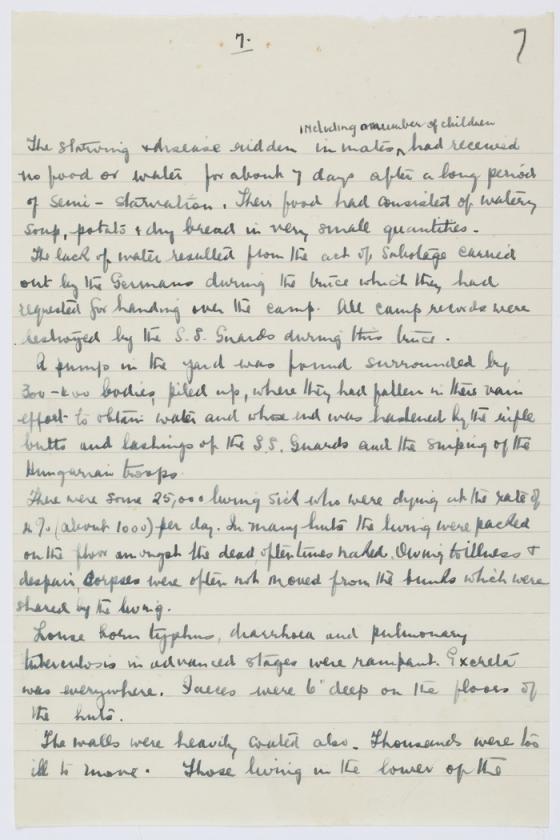The Holocaust
The history of the modern world and Australia from 1918 to the present, with an emphasis on Australia in its global context.
Key inquiry question #1
What were the consequences of World War II? How did these consequences shape the modern world?
Key inquiry question #2
How was Australian society affected by other significant global events and changes in this period?
Content summary
Students investigate in depth ONE school-developed topic drawn from the context presented in the Stage 5 overviews, 'The Making of the Modern World' or 'The Modern World and Australia':
- The Holocaust
Background Notes for Teachers
Ask students to:
- Analyse Muriel Doherty's letter, paying particular attention to detail.
- Answer the questions.
- Conduct additional research using links provided to online articles.
Addtional Resources
- Biography of Muriel Knox Doherty, ‘Australia’s War 1939-1945’.
- Russell, R. Lynette, 'Doherty, Muriel Knox (1896–1988)', Australian Dictionary of Biography, National Centre of Biography, Australian National University.
- Muriel Knox Doherty, Letters from Belsen 1945: an Australian nurse's experiences with the survivors of war, edited by Judith Cornell & R. Lynette Russell. Doherty, M. K. (Muriel Knox), 1896-1988, St. Leonards, N.S.W: Allen & Unwin, 2000.
- ‘Off the record - the life and times of Muriel Knox Doherty 1896-1988: an autobiography’, edited by R. Lynette Russell. Doherty, M. K. (Muriel Knox), Glebe, NSW: New South Wales College of Nursing, 1996.
Student Activities
The Holocaust
Students learn about Muriel Knox Doherty and her experiences at the liberated Bergen-Belsen Concentration Camp.

NSW Syllabus for the Australian Curriculum History K - 10
A student:
- HT5-1 explains and assesses the historical forces and factors that shaped the modern world and Australia
- HT5-3 explains and analyses the motives and actions of past individuals and groups in the historical contexts that shaped the modern world and Australia
- HT5-4 explains and analyses the causes and effects of events and developments in the modern world and Australia
- HT5-5 identifies and evaluates the usefulness of sources in the historical inquiry process
- HT5-7 explains different contexts, perspectives and interpretations of the modern world and Australia
- HT5-9 applies a range of relevant historical terms and concepts when communicating an understanding of the past
Students:
Comprehension: chronology, terms and concepts
- read and understand historical texts
- use historical terms and concepts in appropriate contexts (ACHHS165, ACHHS183)
Analysis and use of sources
- identify the origin, content, context and purpose of primary and secondary sources (ACHHS169, ACHHS187)
- process and synthesise information from a range of sources as evidence in an historical argument (ACHHS170, ACHHS188)
- evaluate the reliability and usefulness of primary and secondary sources for a specific historical inquiry (ACHHS171, ACHHS189)
Perspectives and interpretations
- identify and analyse the reasons for different perspectives in a particular historical context (ACHHS172, ACHHS173, ACHHS190, ACHHS191)
- recognise that historians may interpret events and developments differently (ACHHS173, ACHHS191)
Empathetic understanding
- interpret history within the context of the actions, values, attitudes and motives of people in the context of the past (ACHHS172, ACHHS173, ACHHS190, ACHHS191)
Research
- ask and evaluate different kinds of questions about the past to inform an historical inquiry (ACHHS166, ACHHS167, ACHHS184, ACHHS185)
- identify, locate, select and organise information from a variety of sources, including ICT and other methods (ACHHS168, ACHHS186)
- Perspectives: people from the past may have had different views and experiences
- Significance: the importance of an event, development, group or individual and their impact on their times and/or later periods
Learning across the curriculum:
- Critical and creative thinking
- Information and communication technology capability
- Literacy
- Personal and social capability